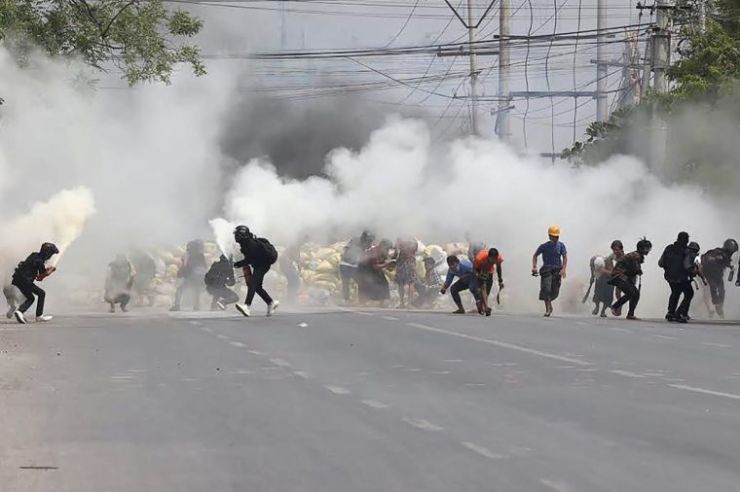
Security forces shot and killed at least 51 people in Myanmar over the weekend as the nationwide protests against last month’s military coup carried on in cities and towns across the Southeast Asian country despite the junta’s violent crackdown.
According to The Assistance Association for Political Prisoners, at least 38 protesters were killed on Sunday alone, a day that has been described as one of the bloodiest since the unrest began on Feb. 1.
On Feb. 1, the military detained civilian leader Aung San Suu Kyi in response to her National League for Democracy party’s landslide victory in last year’s election. The coup makes an army general the de-facto leader of the country.
The New York Times reports that at least 51 people were killed by soldiers and police officers over the weekend as the nationwide civil disobedience movement shows no sign of waning despite the military junta’s continued use of force, teargas, rubber bullets and live rounds to silence protesters.
AAPP, an organization monitoring the killing and arrest of protesters, said at least 38 were confirmed to have been killed Sunday, adding that “casualties are drastically increasing.” It also reported that about 100 protestors, including students and youths, were arrested Sunday.
The majority of the casualties were reported from the Hlaingthaya district of Yangon, Myanmar’s commercial hub and former capital, on Sunday after protesters torched Chinese-funded factories as Beijing supports the military junta. Following attacks on the businesses, martial law was declared in the district, which allows the military to assume authority.
The military and police personnel also used force on protesters in the areas of South Okkalapa, Shwe Pyi Thar Township, Tamwe Township, North Okkalapa Township, Thingangyun Township, South Dagon, North Dagon, Bago, Mandalay, HpaKant and Myitkyina in Kachin State, as well as Taunggyi in Shan State, among others, the AAPP reported.
At least 126 people have been killed in Myanmar “due to violent and arbitrary crackdowns,” according to the AAPP.
The United Nations Special Envoy for Myanmar Christine Schraner Burgener “strongly” condemned “the continuing bloodshed in the country as the military defies international calls, including from the Security Council, for restraint, dialogue and full respect for human rights and fundamental freedoms.”
“The ongoing brutality, including against medical personnel and destruction of public infrastructure, severely undermines any prospects for peace and stability,” Burgener said in a statement.
The AAPP reported that 2,156 people had been arrested, charged or sentenced, while 1,837 people were still in detention as of Sunday,
Last week, Catholic nun Sister Ann Rose Nu Tawng made headlines by going down on her knees in front of police, pleading with them to stop shooting and spare “the children.” In the town of Myitkyina in the Christian-majority Kachin State near the China border, she offered up her life instead.
A viral video showed the member of the Sisters of St. Francis Xavier congregation in a white robe and black habit kneeling with her arms spread on a street while speaking to two police officers who were also kneeling.
“I begged them not to hurt the protesters, but to treat them kindly like family members,” the nun told Reuters. “I told them that they can kill me. I am not standing up until they give their promise that they will not brutally crack down on protesters.”
Christians make up just over 7% of the majority-Buddhist nation. Formerly known as Burma, the country is ranked No. 18 on Open Doors USA’s World Watch List of 50 countries where it's most difficult to be a believer.
Rights groups have warned that the military’s consolidation of power will only make things worse for religious minorities and have urged the international community to take action against the abuses being perpetrated by the military regime.
“The military is notorious for its relations with the ultranationalist ultra-Buddhist group the Ma Ba Tha,” International Christian Concern's Southeast Asia Regional Manager Gina Goh said earlier. “The military together with Ma Ba Tha has targeted the Muslims in the country, but they also go after Christians. Once they get a hold of the power, they might resort to things they were doing before they passed the power to the civilian government. They kill. They rape minority Christians.”
The military in Myanmar controls 25% of the government, according to the country's Constitution. Military leaders are nationalists who support Buddhism.
Goh called the coup a "power play."
"The military is almost like a gang," she said. "They can use their power to intimidate people.”
Courtesy of The Christian Post.




